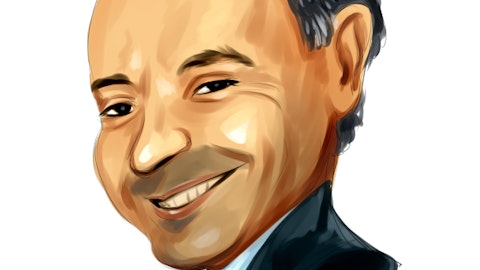The Public Sector Pension Investment Board (PSP Investments), a Canadian pension investment manager with $112 billion of assets under management, accused Boaz Weinstein’s Saba Capital in a lawsuit filed on Friday of ripping it off after the firm requested a redemption of its investment earlier this year. PSP Investments alleges that Saba Capital “engineered” a “one-time markdown” of one of its hedge funds’ portfolio, “in bad faith,” to skim value off the total amount asked by the firm in its request to pull out all of its investments in the hedge fund as of March 31, 2015. PSP Investments had $500 million in Weinstein’s Saba Offshore Feeder Fund, making it the fund’s largest investor. The lawsuit filed at the New York State Supreme Court follows an outflow of capital from Saba Capital after years of losses.

We follow hedge funds because our research has shown that their stock picks historically managed to generate alpha even though the filings are up to 45-days delayed. We used a 60-day delay in our back tests to be on the safe side and our research showed that the 15 most popular small-cap stocks among hedge funds outperformed the S&P500 Total Return Index by an average of 95 basis points per month between 1999 and 2012. After adjusting for risk, our calculations revealed that these stocks’ monthly alpha was 80 basis points. We have also been sharing and tracking the performance of these stocks since the end of August 2012, during which time they have returned 118%, outperforming the S&P500 ETF by over 60 percentage points (see more details here).
According to the pension board, it invested $300 million in February 2012 for Class A shares. Another $200 million was invested in June 2013. This was in the middle of Saba Capital’s three-year losing streak in 2012, 2013 and 2014. This led to investors pulling out money from the hedge fund, which was what PSP Investments did earlier this year. When PSP Investments poured capital into Saba Capital, the latter had about $4 billion in assets under management. At its height in the summer of 2013, Saba Capital managed over $5 billion in assets. Now, the firm manages a considerably-smaller $1.6 billion in assets.
Follow Boaz Weinstein's Saba Capital
The lawsuit comes at a bad time for Weinstein as investors appear to have grown wary of his fund over the last three years. The performance of Saba Capital in the three years ending in 2014 appears parallel to his last days at Deutsche Bank, where his group tallied a $1.8-billion loss in 2008. He founded Saba Capital in 2009 and gained notoriety in 2012 for trading against J.P. Morgan Chase & Co.’s “London whale” which lost the bank more than $6 billion.
After the losses of Saba Capital in the said years, PSP Investments reexamined its stake in the hedge fund beginning last year, ultimately requesting Saba to give back all of its investment. Saba Capital appealed to the firm, which manages the pension funds of the Canadian Forces, the Royal Canadian Mounted Police, the Reserve Force of Canada, and the Public Service of Canada, to redeem all its Class A shares in three installments, but PSP Investments rebuffed the request. This is when Saba Capital is alleged to have manipulated its portfolio’s value to diminish the total amount of the payout during the redemption process. Particularly, the lawsuit alleges an “arbitrary” markdown of corporate bonds of McClatchy Co. The lawsuit goes on to say that Saba Capital then marked up the value of the bonds back to the values prior to the redemption.
However, Saba Capital, in a statement quoted by The Wall Street Journal, said that the lawsuit is “meritless,” pointing out that PSP Investments is complaining about the valuation of two securities among over a thousand. Furthermore, the value in contention is just 2.6% of PSP Investment’s former investment with Saba. Saba Capital highlights that the two securities in question were valued via “an industry-standard bid wanted in competition (BWIC) process” in which competitive bids are solicited from every leading broker and dealer of the securities being priced. Furthermore, the valuation is then vetted and approved by at least four external advisors, including auditors, outside counsel, fund administrator, and Saba’s external members of its board of directors apart from the hedge fund’s internal valuation committee, it said. Saba Capital added that the BWIC prices were not used only during the PSP Investments redemption period, but also for the second and third quarters of 2015.
According to its latest 13F, the top picks of Boaz Weinstein’s Saba Capital are mostly in closed-end funds. The top three long positions of the fund, which disclosed a equity portfolio worth $999.39 million, are Blackrock Corporate High Yield Fund Inc (NYSE:HYT), BlackRock Debt Strategies Fund, Inc. (NYSE:DSU), and Blackstone / GSO Strategic Credit Fund (NYSE:BGB) in which it had 6.33 million shares, 16.51 million shares, and 2.4 million shares, respectively, at the end of June.
Disclosure: None





